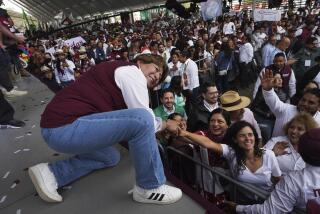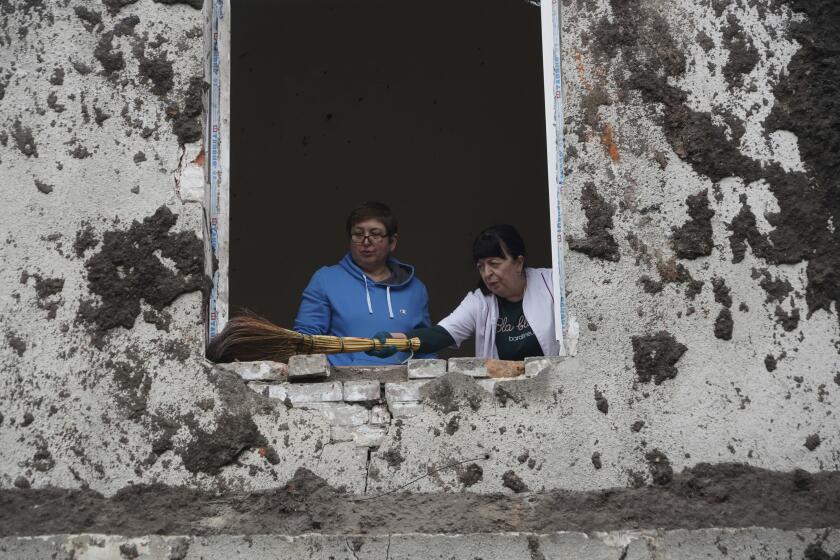Around Cairo, some semblance of normality returns
Anti-government protesters continued to fill Tahrir Square on Sunday. But barely half a mile away, where Tahrir Street spills into the teeming middle-class neighborhood of Dokki, the dense cacophony of a typical Cairo afternoon had settled, like the day’s warm and calming rain, over the upheavals of the week before.
Old men sat lazily over cups of tea on spindly chairs arranged outside their shops. Cars jockeyed for momentum down the hopelessly congested street. A waiter scurried through the tables at a crowded sidewalk cafe, the early afternoon air bathed in the fragrant smoke of shisha pipes and roasting shawarma. A woman and her daughter, smiling with arms linked, pushed through the crowded sidewalk and into a newly opened bank.
“People are getting back to whatever they were doing before all this, which is as it should be,” said Mohammed Mahmoud, leaning on the counter of his small shirt store in the heart of Dokki’s biggest commercial district.
He nodded toward the square, where protesters, vowing to hold their ground until President Hosni Mubarak resigns, continue a boisterous but somewhat isolated protest.
“So you have some people leaving here to protest, and you have others going to work. This will not really hamper anything,” he said. “Eventually, they’ll be on their own, and they’ll be totally isolated from the rest of the country.”
Sunday saw Cairo begin to return to a kind of normality. Though most schools and universities remained closed, hundreds of banks reopened and a large number of people went back to work. Many citizens outside the square, alarmed at the violence, looting and lost income of the last week, now appear quite willing to allow Mubarak to remain at the helm until fall if it will bring the country back from what has seemed a frightening brink.
“As far as the demonstrations, they should be over,” said Mohammed Ibrahim Mohammed, who works for an import-export business that has been paralyzed over the last week with the closure of banks and most stores and offices across the city.
“The people of Tahrir, now I don’t know why they stay there, to be honest,” he said. “They made their demands clear. Now there’s going to be elections. What more do they want?”
Mubarak has hardly surged in the popularity polls. Yet at least here in Dokki, nearly everyone interviewed showed a clear preference for letting him serve out his term while holding the government to its pledges for reform. Many seemed worried about what might follow any abrupt presidential departure.
“They must understand that things take lots of time. They must let the government have the full five months to take care of everything, and then we’ll have elections. Otherwise, there will be chaos,” said Rafiq Kamel, 55.
Many other areas of Cairo appear equally untouched now by the lawlessness and fear that accompanied the virtual disappearance of the police from the streets last week, forcing many citizens to hide in their homes and form neighborhood protection squads to hold off looters.
By Sunday, the start of the daily curfew had been pushed back from 3 p.m. to 7 p.m., neighborhood watches had been largely disbanded here in Dokki, and police were back at their posts, guarding banks, directing traffic and standing idly in small groups at the side of the road, chatting and smoking.
Crowds of taxis and a few private cars jammed in fuming hordes into a gasoline station, where supplies have shrunk because of the difficulty of getting fuel trucks through the city’s occasionally turbulent streets.
Long lines likewise formed outside many banks across the city after the government allowed 341 branches to open Sunday morning, 152 of them in Cairo. And although unlimited transfers between accounts were permitted, Central Bank officials, apparently fearing a bank run, limited cash withdrawals to 50,000 Egyptian pounds (about $8,500) or $10,000 in foreign currency.
With a continuing rush to buy foreign currency, the Egyptian pound slipped significantly but not precipitously against the dollar. Officials delayed Sunday’s planned opening of the stock market, probably until Tuesday or later.
Outside the Bank of Alexandria branch here on Tahrir Street, lines had evaporated before closing time at 1 p.m. A team of plainclothes security officers allowed patrons in a few at a time and scowled at anyone else who looked as if he might want to enter.
“No,” one said.
Inside, though, the bank’s atmosphere had been transformed. The bank manager was uncharacteristically perky and cooperative, said Mohammed of the import-export company.
“She was helping everyone to get their services on time,” he said. “Before, she was always shouting and yelling to get people to stand in line, and then she’d help her friends to the front of the line, and everyone would shout back. None of that happened today.
“Maybe what’s happened this week is causing people to be helpful to each other.”
He seemed unconvinced and was also, for the moment, still penniless. The check needed for salaries and other expenses from one of his Egyptian buyers, who himself hadn’t been able to get to the bank for days, had bounced.
More to Read
Start your day right
Sign up for Essential California for news, features and recommendations from the L.A. Times and beyond in your inbox six days a week.
You may occasionally receive promotional content from the Los Angeles Times.






